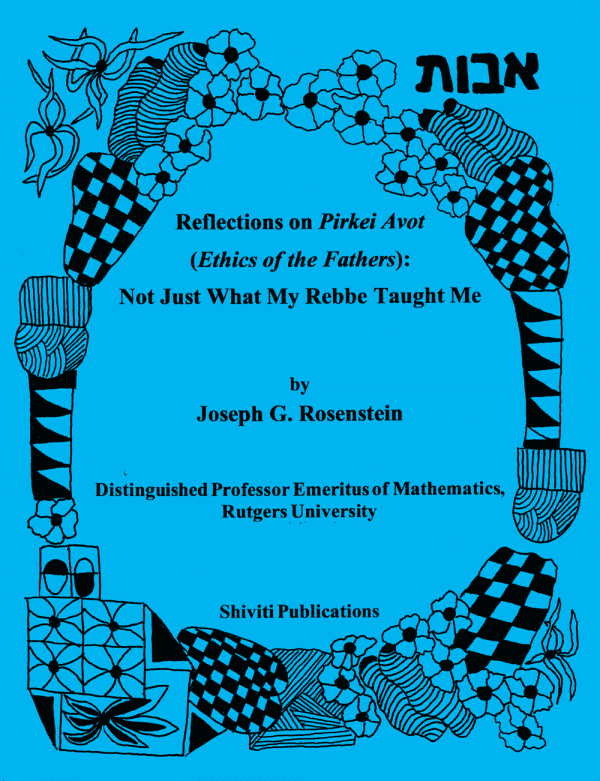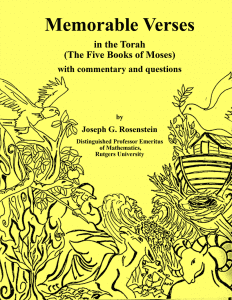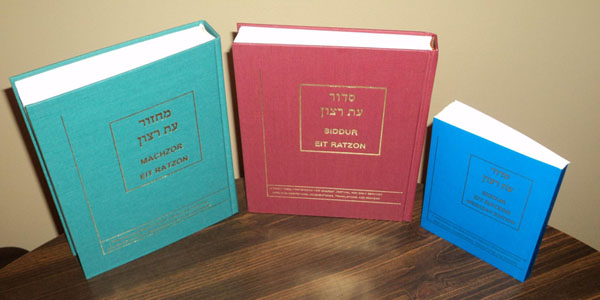Judaica
I have published the following books; each of the three bulleted items has its own page on this website, where much more information can be found.
- Eit Ratzon Prayerbooks (2004). Jewish prayerbooks that are both traditional and unconventional, egalitarian and pluralistic, and include a full transliteration, new translations that resonate with modern readers, commentary on every page, and additional prayers and meditations.
- Memorable Verses in the Torah (2017). A collection of about 150 verses in the Torah (the Five Books of Moses) that the author and his students considered memorable, together with a two-page discussion of each verse, and what makes it memorable.
- Reflections on Pirkei Avot (Ethics of the Fathers): Not Just What My Rebbe Taught Me (2022). A critical commentary on Pirkei Avot, with reflections on the context of the teachings and their relevance for modern times. It compares teachings on the same theme, noting the development of each theme in situ and in special chapters on each theme.


Other Jewish Publications
Over the years I have prepared a variety of materials related to Judaism, selections of which I am posting here, with an introduction to each group of materials. These materials are presented roughly in chronological order; most date from before 2000 since my focus after that date has been on the books described above.
D’var Torah columns
During the 1990s, the National Havurah Committee published a weekly D’var Torah column in a number of newspapers. The NHC was evidently the first to do this; over the following years, there were many weekly D’var Torah columns published by individuals and groups, first in print and now electronically. I wrote the following three columns as part of that enterprise.
- Stepping Forward: A D’var Torah on parshat Vayiggash
- On the Road to Moab: A D’var Torah on Parshat Balak
- Eating Meat: Old and New Sensitivities: A D’var Torah on Parshat Re’eh
Newspaper Articles
- Atoning for Our Religious Convictions. (Letter to the Editor 10/96 on anniversary of Rabin’s assassination.)
- The Search for Hidden Messages. (February 1997 article in local Jewish newspaper on “codes”.)
- Gates of Righteousness. (May 1997 article in local Jewish newspaper on “orthodoxies”.)
- God and Rain. (October 1997 article in local Jewish newspaper on “Biblical views of science and punishment”.)
- Letter to the Editor (6/12/01 on occasion of Timothy McVeigh’s execution.)
Guided Meditations
During the 1990s I led many guided meditations on traditional prayers for small local groups and at retreats and institutes of the National Havurah Committee. In 1996 I published a tape that contained guided meditations, each half an hour long, on Psalms 23 and 27. I had intended to publish a number of other meditations, but the only other one that was completed was an hour-long guided meditation on the morning (Shacharit) prayer service. They are available here in both text and audio formats. Caution: Do not list to guided meditations while driving a car; doing so will slow down your response time and potentially endanger your life.
- Restoring My Soul: A Guided Meditation on Psalm 23 (text)
- Restoring My Soul: A Guided Meditation on Psalm 23 (video)
- Gathering Me In: A Guided Meditation on Psalm 27 (text)
- Gathering Me In: A Guided Meditation on Psalm 27 (video)
- Guided Meditation on the Morning Service (text)
- Guided Meditation on the Borchi Nafshi Prayer (text)
Books
There are two books that I intended to write after publishing Siddur Eit Ratzon and devoted a great deal of energy to them before focusing on Memorable Verses and then Pirkei Avot. Perhaps I will yet complete them, but I am posting here the results of my efforts.
- The Psalms in the Liturgy
- The Theology of Siddur Eit Ratzon

Prayers and Meditations. In writing Siddur Eit Ratzon, I developed and wrote a number of prayers and meditations that I thought would enhance the prayer experience of those who recited them. The first 3:30 of
this video explains why meditation has that effect. (The remaining 10 minutes of the video has the meditation that accompanies item c below.) Following is a selection of these prayers and meditations:
- Meditation on God’s Presence. The core prayer of each prayer service is the Amidah, which is choreographed – in both structure and accompanying movements – as an audience with God. Missing from the end of the Amidah is a prayer that discusses how one can resume being in God’s presence after the Amidah. This meditation speaks to that problem. For a recording of this Meditation on God’s Presence, click here
- Asking God for Assistance The weekday Amidah includes petitionary prayers, but these are missing from the Shabbat Amidah. Since most non-Orthodox Jews recite the Amidah only on Shabbat, the traditional prayerbook does not provide them with an opportunity to express their needs, problems, hopes, and wishes to God. This prayer (in Hebrew and English) provides them with such an opportunity.
- Blessings that are Streaming toward Us
For a recording of this meditation, start at 3:30 on this video - Expressing One’s Gratitude
- Envisioning God’s New House
- A Supplement to the Haggadah
- Meditation on Sinai
- Welcome to Our Community A Ceremony for a Bar-Mitzvah or a Bat-Mitzvah
Essays
The first two essays below appear in Machzor Eit Ratzon. They reflect my attempt to understand how Rosh Hashanah and Yom Kippur have been observed over the past 3000 years and how Rosh Hashanah has become an appendage of Yom Kippur. The third essay was written before, during, and immediately after my trip to Poland in 2012. The fourth essay was written in conjunction with my presentation on prayer at a CAJE Conference.
- What is Rosh Hashanah All About?
- What is Yom Kippur All About?
- Poland Trip – August 2012 – Reflections
- Teaching Prayer to the Adults that Our Children will Become
- On That Day an article that appeared in The Reconstructionist that discusses the Aleinu prayer.
- Petitionary Prayer on Shabbat: Revisiting the Issue
- The Tenth Commandment – “Thou Shalt Not Covet” based on materials collected for a 2011 workshop of the National Havurah Committee
Daily Daf Differently. DDD is a daily ten-minute podcast that discusses the daily page (Daf Yomi) of the Talmud, where each participant prepares a week’s worth of podcasts. I prepared 7 podcasts dealing with Rosh Hashanah in 2014 and 7 podcasts dealing with the nazir (nazirite) in 2015. These are available below in both print and audio formats. The conclusion that I came to is that the traditional understandings of the nazir are incorrect. I think that the nazir was a person who wanted to offer himself or herself to God … as a sacrifice. This may have been an option in ancient Canaan, but was no longer acceptable in Judaism. The only part of oneself that one could offer to God was one’s hair; the rules for the nazir are intended to ensure that one’s hair is grown in a state of purity so that it can be burned on the altar.
- Tractate Rosh Hashanah 29-35 (text)
- Tractate Nazir 2-8 (text)
Presentations
Poems
Limericks and Other Humor
- Limericks for Purim
- Limericks about my beard – written to celebrate its 40th birthday
- Cape Cod Limericks at the National Havurah Committee’s annual Cape Cod Retreat
- Crossing the Sea
- A Responsum of the Holy Lud Rebbe
the translation of a Responsa offered to one of the members of his community. This is my contribution to the esteemed genre of Purim Torah.
Quora Responses. Quora is an electronic platform that provides people around the world an opportunity to ask questions and obtain responses to those questions from other participants. Following is a selection of my responses, grouped by topic:
